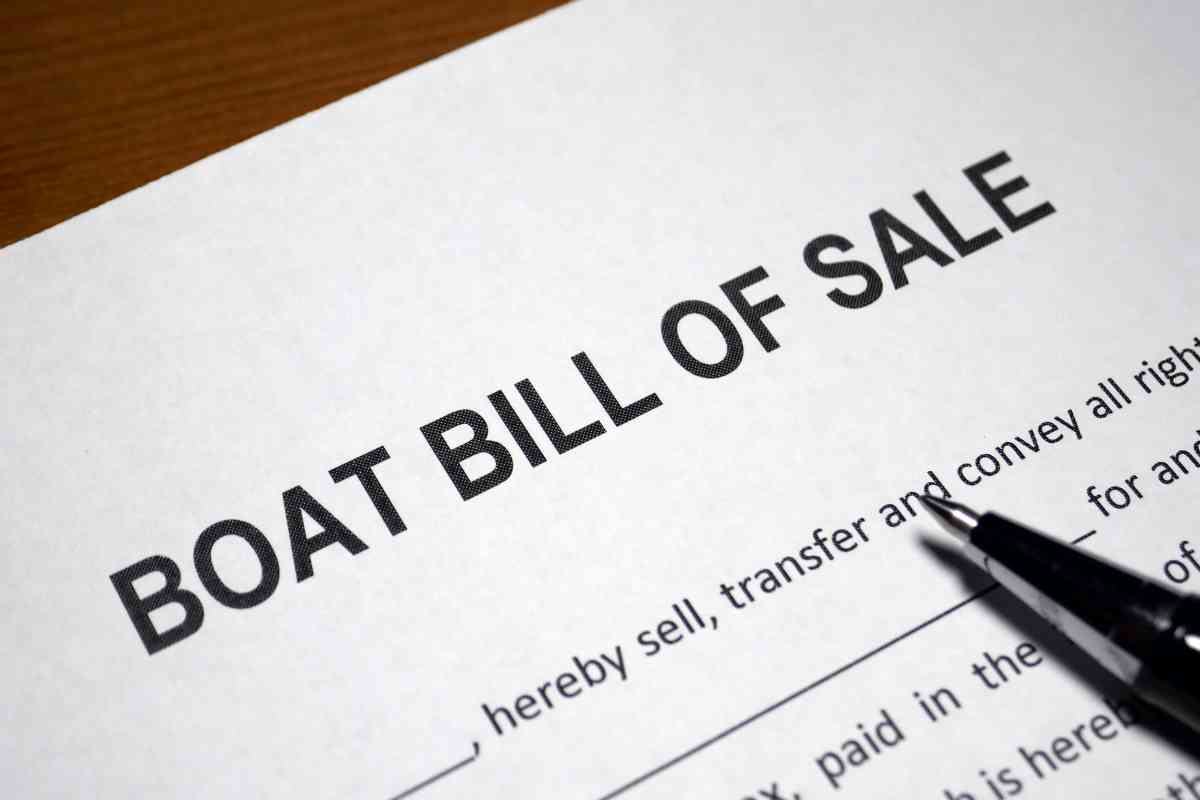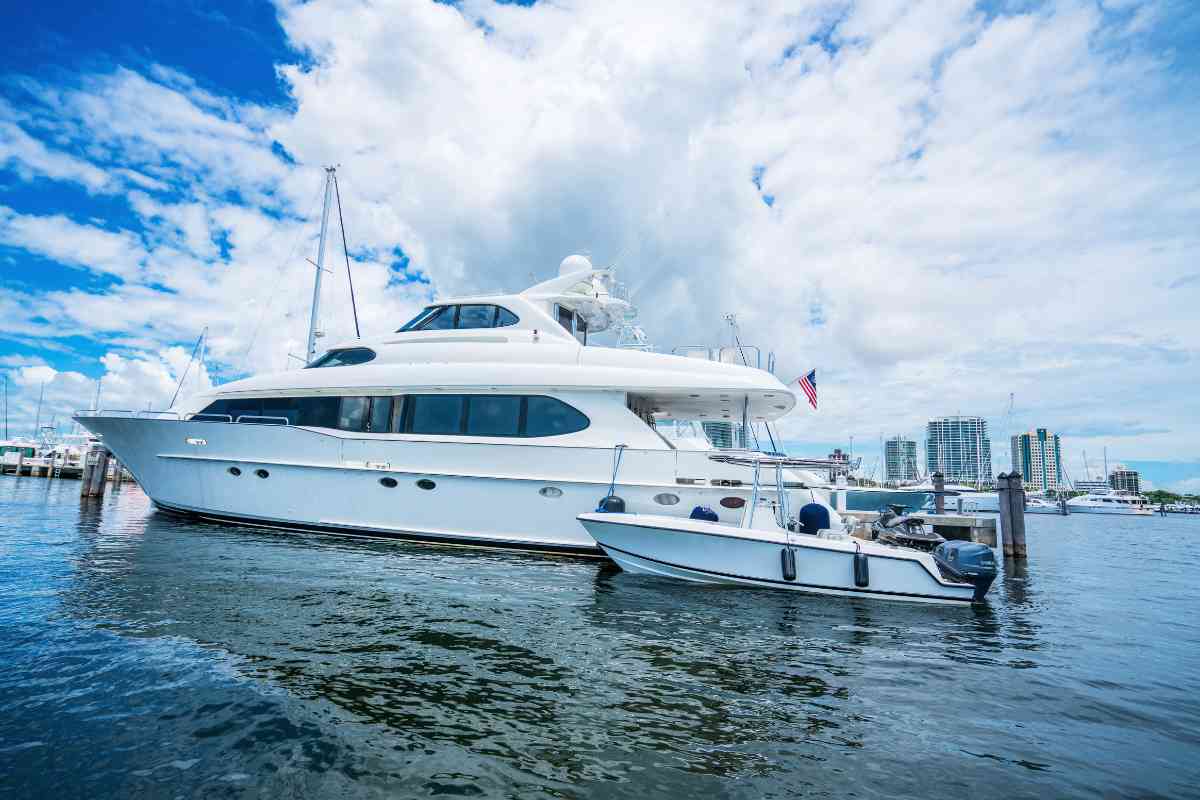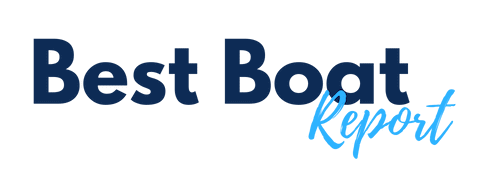How to Become a Yacht Broker in Florida: A Clear Guide
Becoming a yacht broker in Florida can be an exciting and lucrative career choice for those who are passionate about boats and enjoy working with people. As a yacht broker, you will be responsible for connecting buyers with sellers, negotiating deals, and ensuring that all transactions are conducted in a legal and ethical manner. If you are interested in pursuing a career as a yacht broker in Florida, there are several steps you will need to take to get started.

How do you become a yacht broker in Florida?
To become a yacht broker in Florida, one must obtain a Yacht and Ship Salesperson License from the Florida Department of Business and Professional Regulation. This requires passing an examination, submitting fingerprints for a background check, and securing a bond.
Additionally, gaining experience and networking within the yachting industry is beneficial.
Key Takeaways:
- To become a yacht broker in Florida, you will need to meet certain educational requirements, obtain the necessary licenses, pass a background check, and secure a surety bond.
- Understanding the Florida yacht market, as well as the laws and regulations that govern the industry, is essential for success as a yacht broker.
- Networking and building contacts within the industry can be an important part of building a successful career as a yacht broker.
Understanding the Role of a Yacht Broker
If you’re interested in becoming a yacht broker in Florida, you should first understand the role of a yacht broker. A yacht broker is a professional who facilitates the buying and selling of yachts and boats. They act as a middleman between the buyer and seller, helping to negotiate the sale and ensuring that all legal requirements are met.

Duties of a Yacht Broker
The primary duty of a yacht broker is to represent the interests of their clients, whether they are buyers or sellers.
As a yacht broker, you will need to have a thorough understanding of the yacht industry, including different types of boats, their features, and their values. You will also need to have excellent communication and negotiation skills to help your clients get the best deal possible.
Here are some of the duties of a yacht broker:
- Meet with clients to discuss their needs and preferences
- Research boats and yachts that meet the client’s criteria
- Arrange viewings of boats and yachts
- Negotiate the sale price and other terms of the sale
- Draft contracts and other legal documents
- Ensure that all legal requirements are met, such as obtaining the necessary licenses and permits
- Coordinate the closing of the sale, including the transfer of funds and ownership
Working with Buyers and Sellers
As a yacht broker, you will work with both buyers and sellers. When working with buyers, you will need to help them find the right boat or yacht for their needs and budget. This may involve researching different boats and yachts, arranging viewings, and negotiating the sale price.
When working with sellers, you will need to help them prepare their boat or yacht for sale. This may involve staging the boat or yacht for viewings, creating marketing materials, and setting a price that reflects the boat or yacht’s value.
Educational Requirements

To become a yacht broker in Florida, you will need to meet certain educational requirements.
While there is no specific degree required to become a yacht broker, having a high school diploma or equivalent is a must. Additionally, having a bachelor’s degree in business, marketing, or a related field can be beneficial.
While a degree is not required, it is recommended that you have some formal education in sales, marketing, and business. This will help you understand the principles of selling and marketing boats, as well as how to manage your business.
Here’s a table that summarizes the educational requirements for becoming a yacht broker in Florida:
| Education | Requirement |
|---|---|
| High School Diploma or Equivalent | Required |
| Bachelor’s Degree in Business, Marketing, or Related Field | Recommended |
| Formal Education in Sales, Marketing, and Business | Recommended |
In addition to formal education, it is also important to gain practical experience in the boating industry. This can be achieved by working in a boat dealership or marina, or by working as a salesperson for a yacht brokerage.
While a degree is not required to become a yacht broker in Florida, having a solid educational foundation in sales, marketing, and business can be beneficial. Additionally, gaining practical experience in the boating industry can help you understand the unique challenges and opportunities that come with selling boats.
Necessary Licenses

To become a yacht broker in Florida, you must obtain the necessary licenses from the Florida Department of Business and Professional Regulation (DBPR). The DBPR is responsible for regulating and licensing yacht brokers and salespersons in the state of Florida.
There are two types of licenses available for yacht brokers and salespersons in Florida: the yacht broker license and the yacht salesperson license.
The yacht broker license allows you to operate your own yacht brokerage and supervise other yacht salespersons. The yacht salesperson license allows you to work for a yacht brokerage and sell yachts under the supervision of a licensed yacht broker.
To obtain a yacht broker or salesperson license in Florida, you must meet the following requirements:
- Be at least 18 years old
- Be a high school graduate or have a GED
- Complete a 40-hour course from an approved provider
- Submit an application on DBPR FORM YS 6000-1
- Pay the $551 fee
- Submit a complete set of fingerprints
- Provide an original surety bond or letter of credit in the amount of $10,000 for a salesperson or $25,000 for a broker
Once you have met these requirements, you will be eligible to take the yacht broker or salesperson licensing exam. The exam covers topics such as yacht brokerage laws and regulations, yacht sales and marketing, and yacht financing.
It is important to note that you cannot obtain a yacht broker license in Florida unless you have been a yacht salesperson for two consecutive years. Therefore, if you wish to open your own brokerage, you will need to first become a salesperson.
Here is a table summarizing the requirements for obtaining a yacht broker or salesperson license in Florida:
| Requirement | Yacht Broker License | Yacht Salesperson License |
|---|---|---|
| Age | 18 years or older | 18 years or older |
| Education | High school graduate or GED | High school graduate or GED |
| Course | 40-hour course from an approved provider | 40-hour course from an approved provider |
| Application | Submit DBPR FORM YS 6000-1 | Submit DBPR FORM YS 6000-1 |
| Fee | $551 | $551 |
| Fingerprints | Complete set of fingerprints | Complete set of fingerprints |
| Bond | Original surety bond or letter of credit in the amount of $25,000 | Original surety bond or letter of credit in the amount of $10,000 |
In addition to obtaining a yacht broker or salesperson license, you may also need to obtain a boat dealer license from the DBPR if you plan to sell new or used boats in Florida. The boat dealer license allows you to legally sell boats in the state and is required for all boat dealers operating in Florida.
Background Check

To become a yacht broker in Florida, you will need to pass a background check with the Florida Department of Law Enforcement.
This is a standard procedure for most professions that require a license. The background check is conducted to ensure that you have not been convicted of any crimes that would disqualify you from obtaining a yacht broker’s license.
To start the background check process, you will need to provide a set of fingerprints. You can get your fingerprints taken at any law enforcement agency in Florida, and there is usually a small fee for this service.
Once you have your fingerprints, you can submit them to the Florida Department of Law Enforcement along with your application.
The background check typically takes a few weeks to complete, and you will be notified of the results by mail. If there are any issues with your background check, you will be given an opportunity to respond and provide additional information.
If you have a criminal record, it does not necessarily mean that you will be automatically disqualified from obtaining a yacht broker’s license. However, the Florida Department of Business and Professional Regulation will consider your criminal history when making a decision.
It is important to note that the Florida Department of Business and Professional Regulation takes the background check process very seriously. Any false or misleading information provided on your application can result in the denial of your license. Be sure to answer all questions truthfully and accurately, and provide any additional information that is requested.
Securing a Surety Bond

To become a licensed yacht broker in Florida, you are required to obtain a surety bond. The bond is a form of insurance that guarantees that you will follow all state regulations and ethical standards in your work as a yacht broker. In the event that you fail to meet these requirements, a claim can be made against your bond to compensate any damages incurred.
The Florida Department of Business and Professional Regulation (DBPR) requires yacht brokers to have a surety bond in the amount of $25,000, and any licensed salesperson working for the broker must provide a $10,000 surety bond on Florida form DBPR YS 6000-2.
There are several companies that offer yacht broker surety bonds in Florida. When selecting a provider, it’s important to consider the cost of the bond, the financial strength of the company, and the ease of the application process.
It’s important to note that the cost of the bond will depend on your credit score and other factors. Some companies may also offer discounts for purchasing multiple years of coverage at once.
When applying for a yacht broker surety bond, you will need to provide information about yourself and your business, as well as undergo a credit check. The application process typically takes only a few minutes and can be completed online or by phone. Once your application is approved, you will receive a copy of your bond in the mail.
In summary, obtaining a surety bond is a necessary step in becoming a licensed yacht broker in Florida. By comparing providers and selecting a reputable company, you can secure the coverage you need at a competitive price.
Understanding the Florida Yacht Market

If you want to become a yacht broker in Florida, it’s essential to understand the state’s yacht market. Florida is known as the “Yachting Capital of the World” for a reason. The state has over 1,200 miles of coastline, more than 30,000 lakes, and a subtropical climate that makes it an ideal location for boating enthusiasts.
Florida’s Boating Industry
Florida’s boating industry generates billions of dollars in revenue each year. According to the National Marine Manufacturers Association, Florida is the number one state in the country for boat registrations, with over 950,000 registered vessels. The state is also home to over 900 marinas, making it an ideal location for yacht owners and enthusiasts.
Florida Yacht Brokers
Florida has a thriving yacht brokerage industry, with many established brokers and dealers operating in the state. Yacht brokers act as intermediaries between buyers and sellers of yachts. They help buyers find the right yacht for their needs and assist sellers in marketing their yachts to potential buyers.
To become a yacht broker in Florida, you must obtain a Florida Yacht Broker License. The process for obtaining this license involves completing a 60-hour course approved by the Florida Real Estate Commission (FREC) and submitting an application to the Department of Business and Professional Regulation (DBPR).
Florida Yacht Market Trends
The Florida yacht market is constantly evolving, and it’s essential to stay up-to-date on the latest trends and developments. Here are some recent trends in the Florida yacht market:
- Increased demand for luxury yachts: There has been a growing demand for luxury yachts in Florida, particularly among high-net-worth individuals.
- Rising popularity of eco-friendly yachts: Many yacht owners are now looking for eco-friendly yachts that are more environmentally sustainable.
- Increased focus on technology: Yacht manufacturers are incorporating more technology into their vessels, such as touchscreens and smart home systems.
Understanding the Florida yacht market is essential if you want to become a successful yacht broker in the state. By staying up-to-date on the latest trends and developments, you can provide your clients with the best possible service and help them find the yacht of their dreams.
Working with Boat Dealerships

If you are interested in becoming a licensed yacht broker in Florida, it is important to understand how to work with boat dealerships. Boat dealerships can be an excellent source of leads for potential buyers and sellers, and establishing relationships with them can be a key part of building your business.
One way to work with boat dealerships is to offer your services as a broker for their clients. Many boat dealerships do not have licensed yacht brokers on staff, so they may be interested in partnering with you to help their clients buy or sell boats. In exchange for your services, you could negotiate a commission split with the dealership.
Another way to work with boat dealerships is to attend boat shows and other industry events. These events are great opportunities to meet boat dealerships and other industry professionals, and to network with potential clients.
You could also consider sponsoring events or offering to speak at industry conferences to increase your visibility and establish yourself as an expert in the field.
When working with boat dealerships, it is important to be professional and knowledgeable. You should be familiar with the boats and services that the dealership offers, and be able to answer any questions that their clients may have.
It is also important to be clear about your role as a licensed yacht broker, and to ensure that the dealership understands the value that you can bring to their clients.
To summarize, working with boat dealerships can be a valuable part of building your business as a licensed yacht broker in Florida. By offering your services as a broker for their clients, attending industry events, and establishing yourself as an expert in the field, you can build relationships with boat dealerships and increase your visibility in the industry.
Understanding Maritime Law
As a yacht broker in Florida, it is important to have a basic understanding of maritime law. This area of law deals with legal issues related to vessels and navigation on waterways. Here are a few key concepts to keep in mind:

Admiralty Jurisdiction
Admiralty jurisdiction refers to the legal authority of a court to hear cases related to maritime law. In the United States, federal courts have admiralty jurisdiction over cases that involve vessels that are “in navigation.”
This means that the vessel must be on water and capable of moving. If a vessel is not in navigation, then state courts have jurisdiction over cases related to that vessel.
Maritime Liens
A maritime lien is a type of security interest that attaches to a vessel. It is similar to a mortgage on a house. If a vessel owner fails to pay a debt related to the vessel, such as a loan or a repair bill, the creditor may be able to place a lien on the vessel.
This means that the creditor has a legal claim to the vessel that must be satisfied before the vessel can be sold or transferred to a new owner.
Salvage Law
Salvage law deals with the legal rights and responsibilities of parties involved in the recovery of a vessel that has been damaged or lost at sea.
Under salvage law, a person who recovers a vessel that is in danger or has been lost is entitled to a salvage award. This is a payment for the services rendered in recovering the vessel.
The amount of the salvage award is typically a percentage of the value of the vessel and its cargo.
Jones Act
The Jones Act is a federal law that provides certain protections to seamen who are injured while working on vessels.
Under the Jones Act, a seaman who is injured due to the negligence of the vessel owner or crew may be entitled to compensation for their injuries. This compensation can include medical expenses, lost wages, and pain and suffering.
International Maritime Organization
The International Maritime Organization (IMO) is a specialized agency of the United Nations that is responsible for developing and implementing international regulations related to maritime safety, security, and environmental protection.
The IMO has developed a number of conventions and protocols that have been adopted by many countries around the world. As a yacht broker, it is important to be aware of these international regulations, as they may affect the sale and operation of vessels in Florida.
When you become a yacht broker in Florida, it is important to have a basic understanding of maritime law. This will help you navigate legal issues related to the sale and operation of vessels.

Networking and Building Contacts
Networking and building contacts is an essential part of becoming a successful yacht broker in Florida. A network of contacts can help you find potential clients, learn about new listings, and stay up-to-date on industry trends.
One way to build your network is to join a yacht club . Yacht clubs are a great place to meet other yacht enthusiasts, including potential clients and other brokers. Many yacht clubs also host events and regattas, providing opportunities to network and showcase your expertise.
Another way to build your network is to join a multiple listing service (MLS). MLSs are databases of yacht listings that are shared among brokers. Joining an MLS can help you find new listings and connect with other brokers who may have clients interested in your listings.
| Pros | Cons |
|---|---|
| Access to a large pool of listings | Requires membership fees |
| Ability to network with other brokers | May have restrictions on the types of listings allowed |
| Can help you find potential clients | May require additional training or certification |
In addition to yacht clubs and MLSs, attending boat shows and industry events can also be a great way to build your network. These events provide opportunities to meet other brokers, yacht owners, and industry professionals.
When building your network, it’s important to be genuine and build relationships based on trust and mutual respect. Don’t approach potential clients or contacts with a sales pitch right away. Instead, focus on building a relationship and establishing yourself as a knowledgeable and trustworthy broker.
By building a strong network of contacts, you can increase your chances of success as a yacht broker in Florida. Keep in mind that building a network takes time and effort, but the rewards can be significant.
Continuing Education and Growth

As a yacht broker in Florida, it’s crucial to keep up with the latest industry trends, regulations, and best practices. Continuing education is an essential part of maintaining your license and staying competitive in the market.
The Florida Yacht Brokers Association (FYBA) offers a variety of continuing education courses that cover a range of topics, including ethics, legal issues, marketing, and sales techniques. These courses are designed to help you stay up-to-date with the latest industry standards and regulations, and to improve your skills as a yacht broker.
In addition to the courses offered by the FYBA, there are many other opportunities for continuing education and growth. You can attend industry conferences and seminars, read industry publications and blogs, and network with other yacht brokers and industry professionals.
When choosing continuing education courses, it’s important to consider your personal and professional goals.
Think about the areas where you want to improve and the skills you want to develop. You may also want to consider courses that will help you specialize in a particular area of the industry, such as luxury yachts or sailboats.
To help you get started, here are some examples of continuing education courses that may be relevant to your career as a yacht broker:
| Course Title | Provider | Description |
|---|---|---|
| Certified Professional Yacht Broker (CPYB) Program | International Yacht Brokers Association (IYBA) | This program is designed to provide yacht brokers with the knowledge and skills they need to succeed in the industry. It covers topics such as legal and ethical issues, marketing, sales, and customer service. |
| Marine Surveying | Society of Accredited Marine Surveyors (SAMS) | This course covers the basics of marine surveying, including boat construction, materials, and systems. It’s a great option for yacht brokers who want to expand their knowledge of boats and boat systems. |
| Marine Insurance | American Institute of Marine Underwriters (AIMU) | This course covers the basics of marine insurance, including policy types, underwriting, and claims handling. It’s a great option for yacht brokers who want to better understand the insurance needs of their clients. |
Remember, continuing education is an investment in your career as a yacht broker. By staying up-to-date with the latest industry trends and regulations, and by developing your skills and knowledge, you’ll be better equipped to serve your clients and grow your business.
Examining the Earning Potential
As a yacht broker in Florida, your earning potential can vary greatly depending on your level of experience and the number of sales you make. According to BoatPursuits, entry-level yacht brokers in Florida can expect to earn around $30,000 to $40,000 per year, while experienced brokers can earn over $100,000 per year.
One of the main factors that can affect your earning potential is the commission rate you negotiate with your clients. Most yacht brokers in Florida charge a commission rate of around 10% of the sale price of the yacht. However, this rate can vary depending on the size and value of the yacht, as well as the level of service you provide to your clients.
Another factor that can impact your earning potential is the number of sales you make. While some yacht brokers in Florida may only make a few sales per year, others may make dozens or even hundreds of sales. The more sales you make, the more money you can earn.
It’s worth noting that becoming a successful yacht broker in Florida requires a lot of hard work, dedication, and networking. You’ll need to build relationships with yacht owners, buyers, and other brokers in the industry to increase your chances of making sales.
Overall, while the earning potential for yacht brokers in Florida can be high, it’s important to remember that success in this industry requires a lot of effort and patience. If you’re willing to put in the work, however, becoming a yacht broker in Florida can be a rewarding and lucrative career choice.
Frequently Asked Questions
What qualifications do I need to become a yacht broker in Florida?
To become a yacht broker in Florida, you must be at least 18 years old, have a high school diploma or equivalent, and complete the required pre-licensing course. You must also pass a state exam and obtain a yacht broker’s license from the Florida Department of Business and Professional Regulation (DBPR).
Are there any specific courses or certifications I need to complete?
Yes, you must complete a 60-hour pre-licensing course from an approved provider before you can take the state exam. The course covers topics such as yacht and ship sales, brokerage management, and legal and ethical issues. You may also choose to complete additional courses or certifications to enhance your knowledge and skills.
How much commission do yacht brokers typically earn?
Yacht brokers typically earn a commission based on the sale price of the yacht. The commission rate can vary, but it is typically between 10% and 15% of the sale price. For example, if you sell a yacht for $500,000 with a 10% commission rate, you would earn $50,000 in commission.
What rules and regulations do yacht brokers in Florida need to follow?
Yacht brokers in Florida must follow the rules and regulations set forth by the DBPR. These rules cover areas such as advertising, record-keeping, and handling of client funds. Yacht brokers must also adhere to ethical standards and provide honest and accurate information to clients.
What are some tips for becoming a successful yacht broker?
To become a successful yacht broker, it is important to build a strong network of contacts in the industry and to stay up-to-date on the latest trends and developments. You should also have strong sales and negotiation skills, as well as a deep knowledge of yachts and the boating industry. Additionally, providing excellent customer service and maintaining a strong reputation are crucial for success in this field.
What is the average salary for a yacht broker in Florida?
According to Salary.com, the average salary for a yacht broker in Florida is around $86,000 per year. However, this can vary based on factors such as experience, commission rates, and the size and type of yachts being sold.
